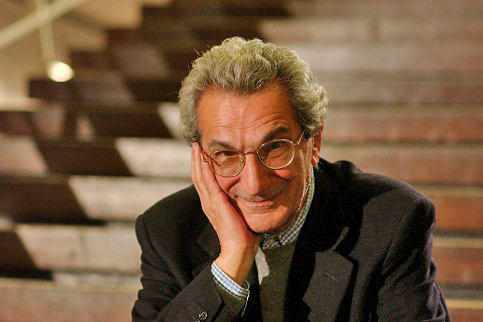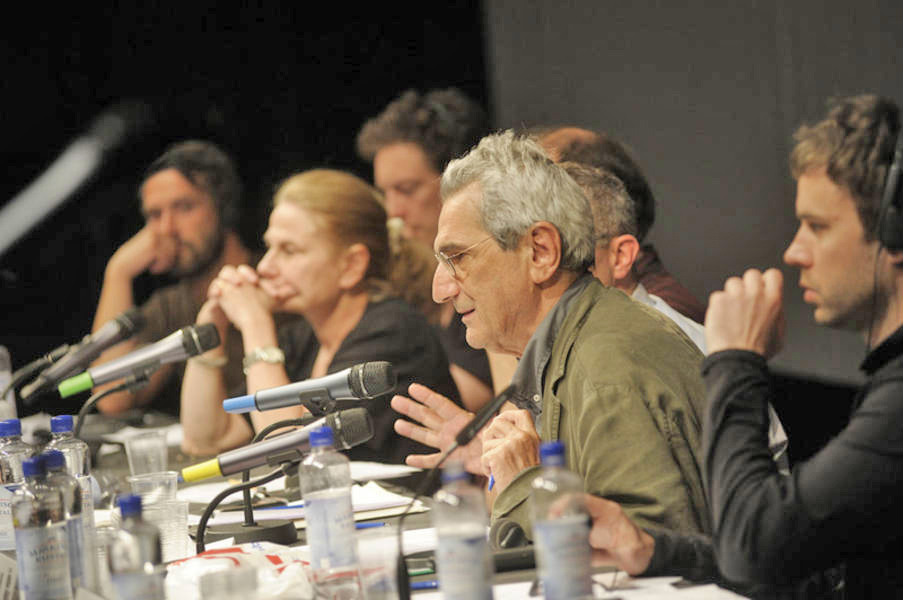Social movements succeed by building counter-power

Antonio Negri, an Italian Marxist sociologist and political philosopher

Professor Antonio Negri lectures at the Idea of Communism Conference in Berlin.
Antonio Negri (1933- ) is a Marxist sociologist and political philosopher from Italy. Negri founded the Potere Operaio (Worker Power) group in 1969 and served as a leading member of Autonomia Operaia. He has taught at the Université de Vincennes (Paris-VIII) and the Collège International de philosophie. His representative works include Empire, Multitude: War and Democracy in the Age of Empire and Commonwealth.
It is said that Antonio Negri was a revolutionary of the 20th century and an observer in the 21st century. As a Western Marxist, he kept pace with the changing times, which gave him insight into the new crisis of capitalism. In recent years, Negri began to pay close attention to China and came to China for academic exchanges. From his perspective, the development in China is a “great experiment” worthy of scholarly investigation. Recently, Negri sat down with a CSST reporter to talk about his ideas on capitalist society and its issues.
CSST: Many people regard you as a practitioner and theoretical researcher of communistic belief. So could you please introduce the source of your beliefs and practices?
Negri: I believe in communism not because it is a purely theoretical question. For me, communism is not a purely theoretical choice but a political one. My first experience with communists is that I stayed in a communist organization in Israel in the early years, met with many communists and lived with them together.
At that time, I had chances to work with other communists and witnessed what communism truly is with my own eyes. When I got back to Italy, I chose to work with workers and communists, which means a lot for both me and my life. At that moment, I could observe how workers were exploited by capitalists and how the Italian communist party reacted to it as well.
CSST: After the American financial crisis, Keynesianism made a comeback. For instance, the Obama administration launched a bailout plan, and Keynesian ideas gained traction within the US government again. Some people just simply assumed that American financial crisis was due to administrative failures and that big government was needed. They even compared such a big government to socialist governments. So what’s your statement on this?
Negri: We should review the historical background of Keynesianism. After World War I, the US was very weak, and it was in this context that the Great Depression came about. Keynesianism attempted to solve social and economic issues and had to admit the existence of both a working and ruling class, but in fact Keynesianism was meant to help the ruling class instead of the working class. In this respect, it differs from socialism and communism.
But the good aspect of Keynesianism is that it proposes the redistribution of wealth. It clearly claims that it is not enough to solely rely on the market to distribute wealth. The strength of the nation or the government is required to solve problems. But ultimately, the aim of Keynesianism is different from that of socialism and communism.
CSST: In 2008, beginning with the US, the financial crisis swept the globe, causing many economists to question the capitalist path. At the same time, a new phenomenon emerged after the financial crisis. Many economic theories began to gain currency under the mantle of the “left wing.” For instance, Capital in the Twenty-first Century was published in 2014. Its author Thomas Piketty is from France, and his book has caught the attention of academics and the media in China. I think one of the reasons you have mentioned is that Piketty used the word “capital” in his book name, but in fact its ideas deviated to Keynesianism. So could you please comment on it?
Negri: The content of Capital in the Twenty-first Century is easy to understand. There are the poor and the rich. Some people are extremely rich but some barely have money in their hands. So the core view of this book is an increasingly expanding wealth gap. But actually the wealth gap isn’t a new idea, and it isn’t necessary for any scholar to put forward such a familiar question in their book, or we cannot attribute this question to his own idea. He proposed some existing question without any innovation.
CSST: Please talk about the concept “multitude” in your recent studies.
Negri: In the contemporary world, “production” has become a general and common action. According to theories of Michel Foucault, since the end of the 18th century, with the development of industrialization, the capitalist world has placed a dual constraint on humanity—on the body and the mind.
On the one hand, a person is individualized, getting rid of subjectification. He or she is forced to accept despotism, and so the individual becomes separated from the world, an isolated and lonely existence. On the other hand, power holds all individuals together, translating them into the nameless, standardized masses with great production capacity. In other words, an individual becomes a gear in the production chain. That’s why that both an individual getting rid of subjectification and standardized and normalized production can coexist. I think that is the dual constraint for individuals from industrial capitalism.
Changes in capitalist model not only stimulate power mechanism, but also pave a new road for rival conflicts against capitalism. In Empire, I and the co-author, my student Michael Hardt, argued that capitalism is caught in a situation of paradox, where the strength it requires is the strength to overturn its own order. The minds and bodies of proletarians are no longer mechanical instruments for production and instead become weapons aimed at capitalist rule.
“Multitude” rests on “metropolis.” Commonwealth, co-authored by Hardt and myself, proposed a question, that is, how a “multitude” is constituted. Actually, the multitude is a subject. Under political conditions of liberation, multitude is a real subject consisting of desire, language, conflict and theory. We should devote ourselves to building an alternative world that is entirely different from the past.
CSST: You recently said that the Obama administration’s bailout plan was unsuccessful. From the perspective of not reaching targets, the Occupy Wall Street movement is another unsuccessful reaction to the American financial crisis. But why have you said that this movement can be regarded as an ideal research model for revolt of the “multitude?”
Negri: Obama’s measures were inevitably defeated because his ideas came from the traditions of Keynesianism. So the condition in which his bailout plan took effect is one in which both labor unions and labor conflicts exist. If there were no labor unions or labor conflicts, Obama’s measures would inevitably lead to a wide wealth gap. Under these conditions, workers cannot ask the nation for help and are left no choice but to explore a counter-power instead. Probably it doesn’t work easily in the US, but it would go relatively well in Europe.
The largest disadvantage of Occupy Wall Street is that this movement hasn’t been led by leaders and didn’t build up a counter-power that is not simply strength but a power. The movement didn’t take the dimension of power into consideration, so it finally failed. American media related Occupy Wall Street to the Tea Party, establishing an idea of dual extremism and consequently diminishing the power of this movement.
In fact, a completely spontaneous movement cannot obtain achievements. Movements need leaders, so what kind of leaders are needed? Once mainstream media and governments discover new movements, they begin to search for their leaders in order to control their actions. This kind of leadership is absolutely not right. Leaders shouldn’t become persons with the right of speech and instead should play a role in grouping all different kinds of activities and strengths together, i.e. related movements of feminists, workers, races and nationalities, in order to combine all these different subjects. Real leaders shouldn’t be afraid of power. We should strive for power, which just follows Machiavelli’s theories.
The biggest question for social movements is how to construct counter-power. The most important place for social movements to fight lies in our way of life. If we could unite ethics and politics, these two different fields, then establishing a counter-power is expected.
Zhang Junrong is a reporter from Chinese Social Sciences Today.
